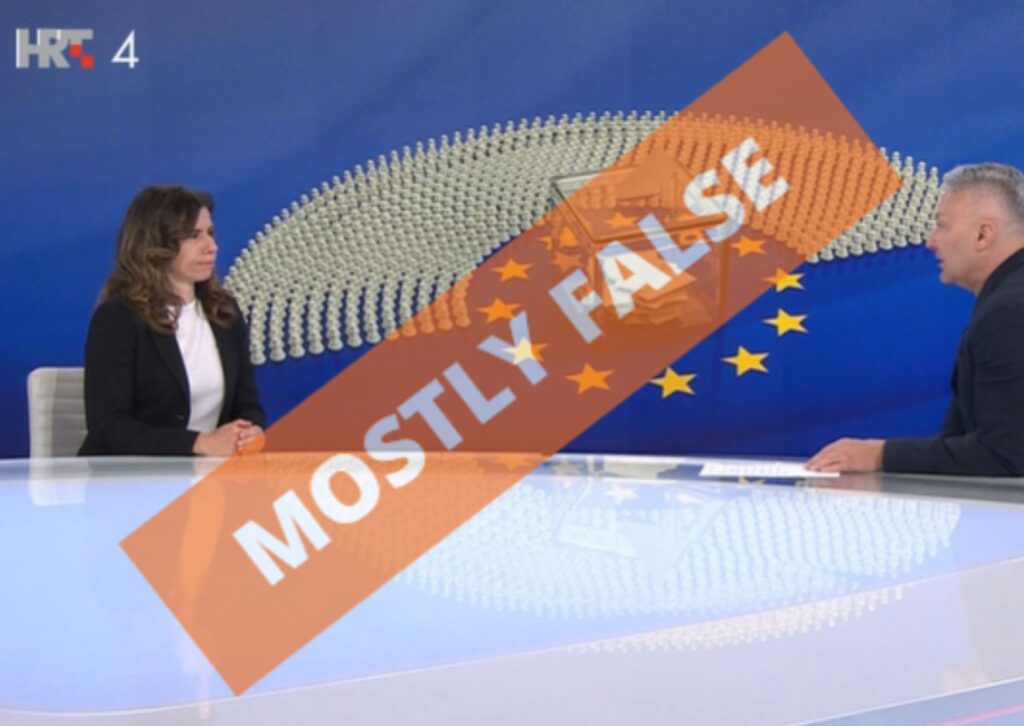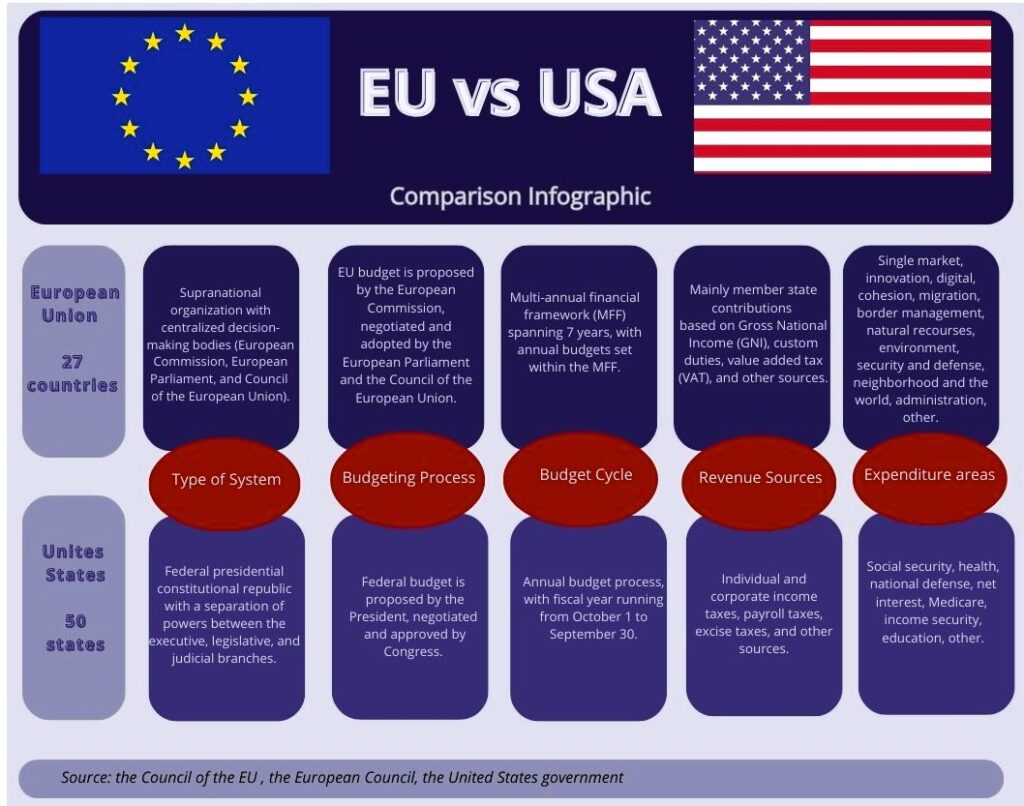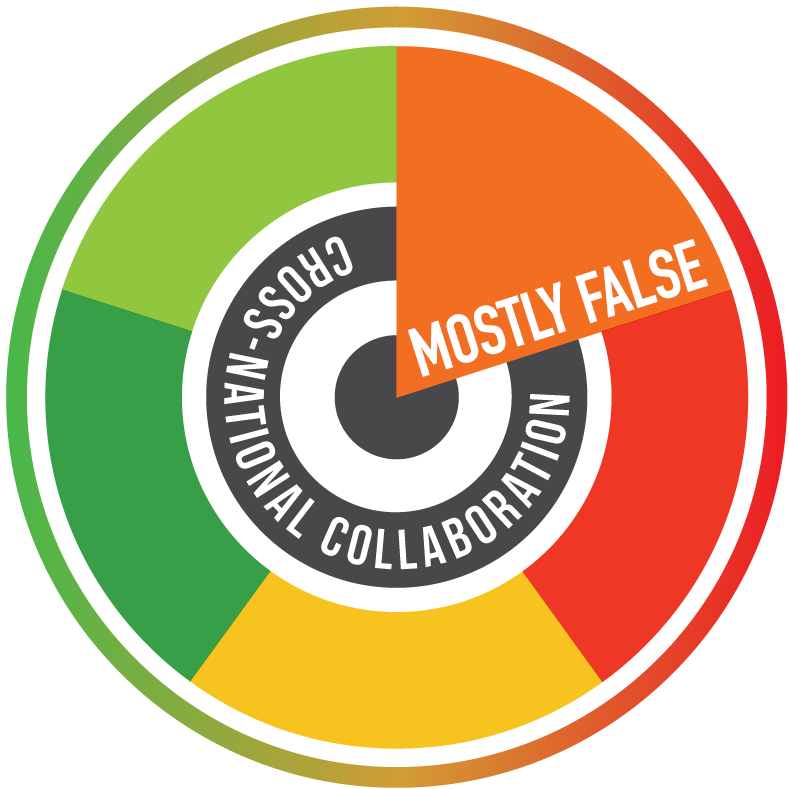During an interview on Croatian Radiotelevision on the 10th of May, the Croatian EU Parliament candidate Katarina Peović claimed: “Only 1% of the budget of the European Union is a share of the GDP of all countries. America has 33% of its budget in relation to GDP.” By comparing the budget of the EU and the US in relation to their market value, she argues that the EU should increase its spending by introducing a tax system. The claim turns out to be mostly true concerning the percentages. However, the economic and fiscal systems can not be compared that easily, presenting a false equivalence.

Katarina Peović is a Croatian left-wing politician running for the EU parliament, as the representative of the Workers’ Front (Radnička fronta), a democratic socialist Party. Created in 2014, the Workers’ Front is a full member of the Party of the European Left and supports anti-fascism, antimilitarism and labour rights. On the 10th of May, Katarina Peović was talking on the Croatian Radiotelevision Program about her program and ideas regarding the EU election 2024, saying: “Only 1% of the budget of the European Union is a share of the GDP of all countries. America has 33% of its budget in relation to GDP.” Hence she was comparing the budget of the EU with the budget of the USA in relation to their GDP to point out that the EU budget is not enough. Since the claim lacks context during the interview, it remains unclear which time period Peovic is referring to and which conclusion can be drawn from it. So it needs to be factchecked in terms of data and context.
The EU and US budget in relation to their GDP
On demand Katarina Peovic wrote that the data she was referring to involves the year 2023. In her statement on TV the Politician claimed that the EU budget counts 1% of the shared GDP of all European countries. The GDP or Gross domestic product indicates the market value of all the goods and services produced within a country measuring the economic activity. As the GDP differs between the European countries, not every EU member contributes to the total GDP in the same amount.
According to Eurostat the total GDP of all the 27 members of the European Union amounted € 16 969 694.5 in 2023. The EU budget proposed by the European Commission for the same year was € 185 billion. This annual EU budget divided with the GDP of all EU countries, delivers little more than 1%. Peovic’s assertion that the EU budget is just 1% share of the entire EU GDP is therefore true and can be backed with data from different reliable sources.
According to Peović, in comparison to this the USA counts 33% of their GDP as their budget. As Peović adds via mail, the budget varies a lot due to special programs such as during the corona crisis and inflation or subsidies for industrial policies and the ‘green transition’. Instead of 2022 she refers to the Government expenditure of 2022 tracked by the international monetary fund, which was 36.26 % of the GDP in the US.
Comparing apples and pears: two different systems
Moreover the economical and political systems of the EU are not as comparable as Peović frames them in her statement. Asked about the conclusion of her statement, Peović writes that the US, “as a much integrated fiscal union, can collect and manage more funds for various programs like the green transition, whereas the EU budget is “miserable” and “absolutely insufficient for a similar program at the level of the European Union”.
To understand what Peović meant by this, it is important to understand the monetary and fiscal systems of the United States of America and the European Union. Despite their shared commitment to market oriented principles, their approaches to monetary policy, fiscal policy and economic governance exhibit significant differences.
Fiscal policy
The United States operates on a model of collaborative federalism, where fiscal policy is a product of joint efforts between the federal and state levels. Congress and the President, representing the Legislative and Executive branches orchestrate fiscal decisions and craft laws on taxation and spending. At the state level, individual Departments of Revenue collect taxes to fund federal programs.
On the other hand, the European Union navigates a delicate balance between member states’ sovereignty and supranational oversight. Fiscal policy is primarily determined by independent fiscal institutions within member states. In response to economic crises, federal-level EU institutions such as the European Commission and Parliament “increasingly influence fiscal policy through collaboration with state-level agencies.”
Monetary policy
In the United States, monetary policy is predominantly orchestrated at the federal level through the Federal Reserve System. This centralized system that acts like a federation includes the Federal Reserve Board of Governors and 12 regional banks. These institutions collaborate to set monetary policy objectives aimed at maintaining financial stability, reducing market risks, and controlling inflation. The Federal Reserve leverages tools such as interest rate controls to steer economic outcomes and ensure stability within the financial system.
On the other side of the Atlantic, the European Union operates a similar model of centralized monetary policy that is managed by the European Central Bank (ECB). The ECB’s main job is to protect the value of the Euro and keep prices stable across countries that use it. Decision-making happens through bodies like the Governing Council and the Executive Board, which collaborate to draft and implement monetary policies. This centralized approach facilitates coordination among Member States, particularly during periods of financial turbulence – they do that by aligning their economic plans and making monetary decisions together at the EU level.

Katarina Peović´s suggestion: a reasonable solution?
In additional information the Workers Front‘ candidate suggests that the EU should increase their budget to €300-420 billion, which is 2.1- 2.9% of the total EU GDP and should introduce a fiscal system similar as in the US. Peović points to a study that was recently published by the European Confederation of Trade Unions, in which they requested the EU representatives not to adopt the decision to activate the fiscal rules. In April 2024 their demand was rejected and new fiscal rules introduced.
Peovic’s statement, despite being well-intentioned, does not convince experts. Xavier Freixas is an economics emeritus professor at Universitat Pompeu Fabra in Barcelona and has been president of the European Finance Association and Deutsche Bank Professor of European Fiscal Integration. In his view, the Croatian politician’s assertions about the EU budget are not adequate because of the absence of an EU fiscal union: “This implies that there is no solidarity in terms of redistribution and that the union is much lower,” he later develops.
On the other hand, he does agree with the highly beneficial aspects of a theoretical fiscal European Union concerning budget: “Going to the fiscal union would imply a huge increase.” However, he sustains that these budget increases should be much more generous than a mere single-digit rise: “Going from 1% to 2% does not make any sense in my view.”
Conclusion
Katarina Peović’s claim about the EU budget being only 1% of GDP is mostly true concerning the presented percentages, but the comparison with the USA is misleading. Comparing the EU, a supranational union to a single nation like the US in terms of budget structure isn’t entirely relevant. Therefore the statement of the croatian politician is mostly wrong.
RESEARCH | ARTICLE | Lucija Janušić, Faculty of Political Science, University of Zagreb (Zagreb, Croatia |Karine Asatryan, Georgian Institute of Public Affairs(GIPA), Multimedia journalism and Media Management (Tbilisi, Georgia) | Ferran Coll, Faculty of Communication, UPF (Barcelona, Spain) | Allegra Knobloch, Crossmedia Journalism and Public Relations, Hochschule der Medien Stuttgart (Stuttgart, Germany)
This factcheck was produced during the Blended Intensive Programme EU Elections Lab at the School of Journalism in Utrecht, The Netherlands
Leave your comments, thoughts and suggestions in the box below. Take note: your response is moderated.





